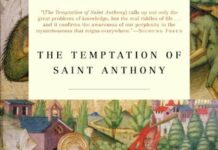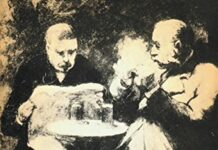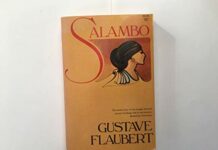
Ebook Info
- Published: 2005
- Number of pages: 144 pages
- Format: EPUB
- File Size: 1.80 MB
- Authors: Gustave Flaubert
Description
Three stories by a French masterFirst published in 1877, these three stories are dominated by questions of doubt, love, loneliness, and religious experience—together they confirm Flaubert as a master of the short story. “A Simple Heart” relates the story of Félicité, an uneducated serving-woman who retains her Catholic faith despite a life of desolation and loss. “The Legend of Saint Julian Hospitator,” inspired by a stained-glass window in Rouen cathedral, describes the fate of a sadistic hunter destined to murder his own parents. The blend of faith and cruelty that dominates this story may also be found in “Herodias,” a reworking of the tale of Salome and John the Baptist.This new edition is a completely new translation with a new introduction by Geoffrey Wall, Flaubert’s acclaimed biographer. It features a chronology, further reading, and explanantory notes.For more than seventy years, Penguin has been the leading publisher of classic literature in the English-speaking world. With more than 1,700 titles, Penguin Classics represents a global bookshelf of the best works throughout history and across genres and disciplines. Readers trust the series to provide authoritative texts enhanced by introductions and notes by distinguished scholars and contemporary authors, as well as up-to-date translations by award-winning translators.
User’s Reviews
Editorial Reviews: About the Author Gustave Flaubert was born in Rouen in 1821, the son of a prominent physician. A solitary child, he was attracted to literature at an early age, and after his recovery from a nervous breakdown suffered while a law student, he turned his total energies to writing. Aside from journeys to the Near East, Greece, Italy, and North Africa, and a stormy liaison with the poetess Louise Colet, his life was dedicated to the practice of his art. The form of his work was marked by intense aesthetic scrupulousness and passionate pursuit of le mot juste; its content alternately reflected scorn for French bourgeois society and a romantic taste for exotic historical subject matter. The success of Madame Bovary (1857) was ensured by government prosecution for “immorality”; Salammbô (1862) and The Sentimental Education (1869) received a cool public reception; not until the publication of Three Tales (1877) was his genius popularly acknowledged. Among fellow writers, however, his reputation was supreme. His circle of friends included Turgenev and the Goncourt brothers, while the young Guy de Maupassant underwent an arduous literary apprenticeship under his direction. Increasing personal isolation and financial insecurity troubled his last years. His final bitterness and disillusion were vividly evidenced in the savagely satiric Bouvard and Pécuchet, left unfinished at his death in 1880.Roger Whitehouse has taught at the Sorbonne and at Bolton Institute, where he is a research fellow.Geoffrey Wall is author of the critically acclaimed Flaubert: A Life and translated Madame Bovary for Penguin Classics.
Reviews from Amazon users which were colected at the time this book was published on the website:
⭐I only read the first two tales, so my review focuses on them. Flaubert is a skilled, evocative writer (Madame Bovary is one of my favorites), but not much of interest happens in these two tales. Sure, they’re tasteful, and crafted with the precision and method one expects of Flaubert. But when all is said and done, they’ve said very little. The best of the two stories – A Simple Heart – has some good and semi-absurd content on the pet parrot of the main character, but that’s about it. Not bad, but for Flaubert fans only.
⭐A Simple Heart must be one of the best short stories I have ever read. Flaubert’s detached narration makes a masterpiece of the final scene, blurring the distinction between events as they occur objectively and events as the dying Felicite experiences them, raising but never answering the question, does she imagine her final vision or does God condescend to appear to her in the image of a familiar object. Answering the question would make the conclusion either trite or cold, but the ambiguity artfully avoids both.
⭐Still a great book because it is Flaubert.
⭐Not what I expected. Difficult to get into.
⭐I enjoyed it as it was for a book club selection.. I found the differant points of view from differnt educators amusing. No one seemed to be able to relate that it was the 1800s.When I read something from another time, I try and place myself there. In doing this I get to be one of the prime charcators.
⭐A fine addition to my 1000 volume library
⭐Flaubert, best known for Madame Bovary, wrote these three ‘long short stories’ as a package near the end of his career. The first one, A Simple Heart, is the best and the best-known. A simple woman, a maid, has a life of tragedy. One person after another that she loved dies or leaves her. An early male lover runs off with another woman, a nephew she thought of as a son dies, her mistress’s daughter dies, then the mistress. Late in life, even her pet parrot that she confused at times with the Holy Ghost, dies. Through it all the woman remains a devout Catholic. Flaubert, a stickler for factually correct detail, rented a parrot from a museum to serve as a model: thus Julian Barnes’ novel, Flaubert’s Parrot.Flaubert was inspired by the story told in stained glass windows in his cathedral in Rouen to write the second tale, The Legend of St. Julian Hospitator. A prince delights is killing animals. When he becomes ruler he delights in killing men. But, like a Greek tragedy, he is told that he will kill his own parents. He flees and stops all killing but he can’t escape his fate. He turns away from killing and establishes hospitals for the indigent. It’s an interesting story, a fable really, about life in the Middle Ages.The third story is Herodias. She lived around the time of Christ. She was Salome’s mother and conspired to kill John the Baptist. It’s a tale of early Christianity. I couldn’t get into this one. The first four pages give us two dozen names of Biblical and historical characters that I assume we are supposed to know but I suspect even a Biblical scholar would struggle with a quite a few of them. Our obsessive fact-checking author told someone he wished he could get hold of a severed heard to be more accurate in his description. (There’s a translator’s introduction that tells us these things.)I’d rate the stories, in order, 4, 3, 2. But, hey it’s Flaubert so I’ll round up it to a 4. I enjoyed the first two but got lost in the last.
⭐Flaubert’s collection of “Three Tales” brings together a wonderful set of short stories. Working from contemporary to ancient and in various modes of realism, Flaubert delves into the spiritual depths of his characters. The first story, “A Simple Heart” is the best of the group. In this story, Flaubert tells the story Felicite, a loyal servant to an uninteresting patron. Flaubert quickly covers her whole life, from her difficult childhood and through her many attachments to her death. Felicite is a woman who feels love deeply, but Flaubert’s presentation is very detached and never maudlin. The last great love of Felicite’s life is a parrot (which also inspired Julian Barnes’ “Flaubert’s Parrot”) who comes to symbolize the holy spirit for her. It would have been easy for Flaubert to portray Felicite’s simplicity as an object of scorn or irony, but he treats her faithfully and never passes judgment on her actions or thoughts. Her story is beautifully told and stands up well to any short story I know.The second tale, “The Legend of Saint Julian the Hospitaller,” is a retelling of the legendary Saint’s life. Flaubert is in a completely different mode here; he is comfortable in the quick and magical progression typical of medieval tales. Flaubert’s eye for detail makes some of the scenes more horrific and as such more effective. In particular, the scenes of carnage while hunting and the scene with the leper are particularly well drawn.The final tale, “Herodias,” is a retelling of the story of John the Baptist’s execution. Here, Flaubert delves into the emotions of religious fervor and political intrigue. He focuses not on Herodias or John, but on Herod. He portrays Herod as caught between competing forces: Rome and the tribes outside his kingdom; his wife and the proconsul; pharisees, essenes, and the fledgling movement spawned by Jesus. All of these competing voices make the story a bit disjointed at times, but once again Flaubert’s realism lends a detached feel to the entire story.Margaret Drabble’s introduction to the volume is useful in how she ties the “Three Tales” into Flaubert’s career and surroundings. The cathedral at Rouen, for example, has a series of stained glass windows depicting Saint Julian’s story, and it also has a statue of the beheading of John the Baptist. Such details help bring the stories into greater clarity, though I recommend reading the introduction last if you have never read the stories, so as to be able to come to the stories fresh.
⭐wonderful characterisation, addressing the emotive reasoning of the heart and mind, and through 3 novels, Flaubert discusses the innocent simple human being in the sophisticated world that we have created in Simple Heart, the human engaging with life to the fullest and the irony of events disengaging the same human from the world in St Julian the Hospitallier, and finally in Herodias, a momemtal few hours of a particular day when everything colludes towards a gruesome end, revealing a multitude of prior historical events and diverse dysfunctional personnages. A good read and much to ponder on.
⭐Classic French Literature at it’s best. Delivered sooner than expected in good condition. Can’t say anything more.
⭐A short easy read for me to enjoy
Keywords
Free Download Three Tales (Penguin Classics) in EPUB format
Three Tales (Penguin Classics) EPUB Free Download
Download Three Tales (Penguin Classics) 2005 EPUB Free
Three Tales (Penguin Classics) 2005 EPUB Free Download
Download Three Tales (Penguin Classics) EPUB
Free Download Ebook Three Tales (Penguin Classics)




